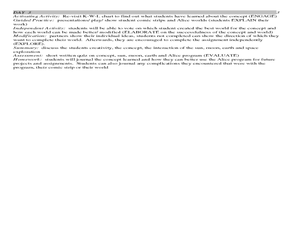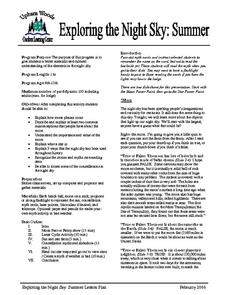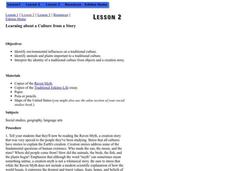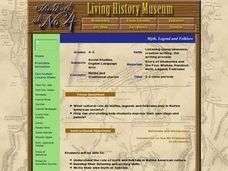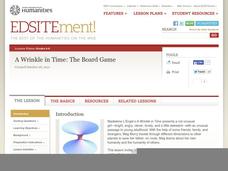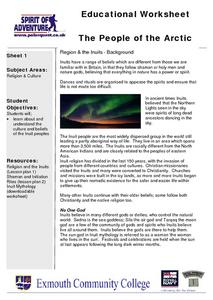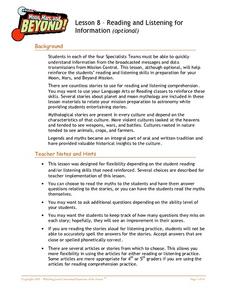John F. Kennedy Center
Writing a Myth
Tap into the imaginative minds of young learners with a creative writing activity. After reading the myth Giants and Mosquitoes, this student guide supports young writers as they brainstorm and develop their very own creation myths....
Curated OER
Shoot for the Moon
Second graders distinguish the different phases of the moon. In this astronomy activity, 2nd graders study the history of its discovery and myths about its origin. They simulate how the moon's surface is illuminated by the sun.
Curated OER
Birthday Moons
Students examine the lunar phases by locating and graphing the Moon phase of their own birthdays. They listen to and discuss lunar myths and create their own Birthday Moon Stories.
Curated OER
Writing Myths I
Explain a natural phenomenon in an original myth. After researching the phenomenon they have chosen, young readers use factual information to include in their myth. They find synonyms and new phrases to create vivid images as they write...
Curated OER
Facts and Myths about our Solar System
Sixth graders explore popular ideas about the Sun and Moon. In this space science lesson, 6th graders separate commonly accepted details about our solar system into facts and myths. Students research a particular idea and create comic...
Journey Through the Universe
Going through a Phase
Ignore the full moon, it's just a phase. Young scholars observe and record the moon during a full cycle before learning to predict future phases. Then the instructor leads a discussion on the other solar system objects that also go...
Curated OER
Moons, Gods and Goddesses
In this moons, gods and goddesses worksheet, students complete a crossword puzzle given 23 clues about gods and goddesses in Greek myths and moons. Students are given a list of the moons in our solar system.
Curated OER
Exploring the Night Sky: Summer
Students explain how moon phases occur. They describe and explain at least two common misconceptions that people have about the moon. Students explain what a star is. They explain 3 ways that the night sky has been used throughout history.
Curated OER
Comet Myths, Facts, and Legends
Here is an interactive book lesson through which learners explore the facts and stories about comets. The plan is comprehensive, providing background information, standards met, vocabulary, assessment ideas, and more. Though the content...
Jefferson Township Schools
Major Gods: Names, Roles, & Symbols
From Aphrodite to Zeus, here you'll find a PowerPoint presentation identifying basic information about 15 Greek gods and goddesses.
Curated OER
Learning about a Culture from a Story
Students interpret the identity of a traditional culture from objects and a creation story. In this lesson on learning about a culture from a story, students read and analyze an Eskimo myth about creation and an essay on Traditional...
Curated OER
Myth, Legend and Folklore
Students examine the role of myths and folklore in the Native American culture. They listen to examples of oral history and write their own. They share their story with the class.
Curated OER
Aztec Myths 1
Students write a diary entry or a letter from the viewpoint of a character in a myth. In this Aztec myths lesson, students define myths and read "The Heart of Copil" and "The Eagle of Tenochtitlan" and find the land of the Aztecs on a...
American Psychological Association
Top 20 Principles from Psychology for PreK–12 Creative, Talented, and Gifted Students’ Teaching and Learning
Who knew getting a better grasp on learning and psychology requires understanding only 20 principles? The resource, especially ideal for high school Psychology, discusses 20 important principles that debunk common myths and provide...
Curated OER
Multicultural Sun, Moon, and Star Activities
Students research the multicultural stories and artistic representations of the Sun, Moon, and stars. In this multicultural space lesson plan, students discuss the symbols and stories for the sun in various cultures. Students construct a...
Curated OER
Celestial Characters
Young scholars read myths and legends about celestial bodies, compare cultural perceptions of celestial personalities, represent "character" of sun, moon, clouds, or stars, and invent their own stories about their chosen celestial...
Curated OER
Weather Myths
Fourth graders relate myths to weather phenomenon. They write and illustrated a weather myth and present it to the class.
National Endowment for the Humanities
A Wrinkle in Time: The Board Game
Tackle some big questions about A Wrinkle in Time by Madeleine L'Engle with a board game project. As learners brainstorm for and complete their board games, they consider what helps and hinders Meg on her journey and why she succeeds in...
Curated OER
Exploring the Night Sky: Fall/Winter
Students explain how moon phases occur. They explain three ways that the night sky has been used through history. Students locate some of the constellations in the night sky. They discuss stories and myths surrounding stars.
PBS
Star Power
Let there be light—or maybe not. Pupils learn about light pollution with an investigation of constellations. They create constellation boxes and experiment with different levels of light. Observations are then made about the lighting in...
Curated OER
People of the Arctic
Read to learn all about the religion and belief systems of the Arctic-dwelling Inuits. This resource includes an easy-to-follow reading passage that is seven paragraphs in length, and five great critical thinking questions.
American Museum of Natural History
What is Astronomy?
Go study the universe. Pupils learn seven aspects about astronomy and astronomers. They begin to learn about constellations; distance and motion between objects; gravity; the electromagnetic spectrum; dark matter and energy; and teams of...
Curated OER
Reading and Listening for Information
Students practice their reading and listening skills in order to obtains accurate information. In preparation for a Moon, Mars, and Beyond Mission project, they read short stories about planet and moon mythology then answer questions...
Curated OER
Solar System Challenge
In this solar system worksheet, learners complete 13 multiple-choice questions to demonstrate their knowledge of the solar system.






